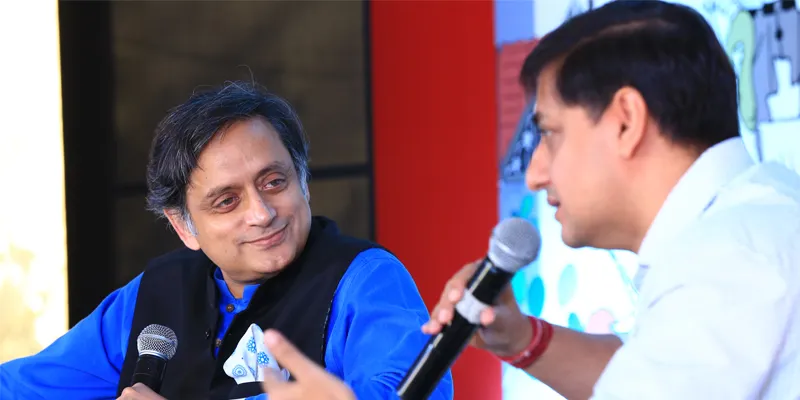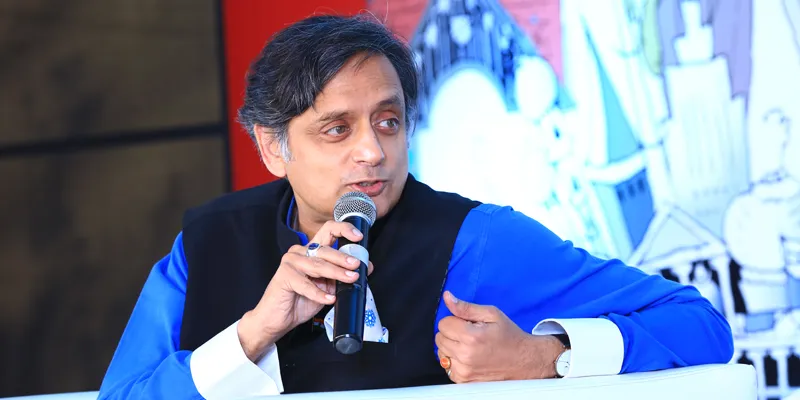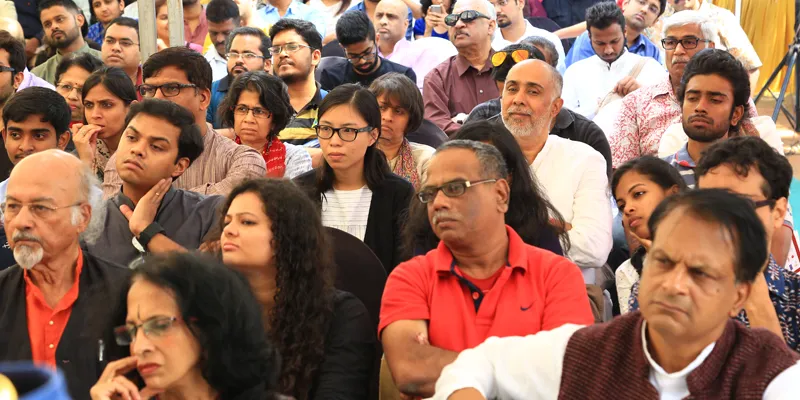'The British owe us an apology for the loot and killings,' says Shashi Tharoor
Among the must things to know about Bengaluru for a newcomer is this interesting fact that late British Prime Minister Winston Churchill -- who so hated the guts of the ‘bloody’ Indians -- still owes Bangalore Club Rs 13 in unpaid bills.
A June 1899 entry in the ledger book of the club, which is on display, has "Lt WLS Churchill" named as one of 17 defaulters.

While this fact often elicits a smile from the newly-informed recipients, it is no laughing matter that the British owe India a colonial debt that is beyond any quantification. “For how do you measure evil?”
Holding forth on the topic of ‘Inglorious Empire: The reality of the British Raj’, on the first day of the Bangalore Literature Festival, 2016, Shashi Tharoor, Congress MP, diplomat, and author, said, “India had been governed for the benefit of Britain. India share of the world economy when Britain arrived on its shores was 23 percent; by the time the British left it was down to below four percent.”
Last month, Tharoor released his new book, An Era of Darkness: The British Empire in India, which was the result of a spirited speech he gave last year at the Oxford Union debate on colonialism. Such was the electrifying effect of that speech that the house voted with him.
Besides the speech going viral on social media, it also earned him an advance for a new book. An Era of Darkness: The British Empire in India elaborates upon Tharoor’s Oxford speech and is essentially a retelling of the British colonial period from an Indian perspective -- the fact that we actually paid for our own oppression.

Despite what the history books and some ‘misinformed’ people may tell us otherwise, the British rule did us more harm than good. According to the book, “Almost 35 million Indians died because of acts of commission and omission by the British—in famines, epidemics, communal riots, and wholesale slaughter like the reprisal killings after the 1857 War of Independence and the Amritsar massacre of 1919.”
And if not reparation payments, Tharoor said the British at least owe us an apology.
Citing examples when German Chancellor Willy Brandt sank to his knees in an apology at Warsaw in 1970, and recently, when Canadian Prime Minister Justin Trudeau sought apology from the Indians for the Komagata Maru massacre, Tharoor said either a member of the British Royal family or the English Prime Minister should go down on their knees on the occasion of the Jallianwala Bagh centenary in 2019 and seek atonement from the misdeeds of the Raj in India.
With his trademark quick wit and easy charm, Tharoor captivated the packed grounds at the lit fest setting the tone for reflection on a bright Saturday winter morning. In an interaction with Sanjeev Sanyal, renowned economist and bestselling writer, Tharoor said that the British way of thinking largely influenced our own view of things -- something that is evident in the archaic laws that are still in place, and the deep-rooted caste divide.

“We know about the British policy of divide and rule, which was largely applied towards the Hindus and Muslims, but what I was not prepared for (during his research for the book) was that the strict caste system as we know it today was the legacy of the British,”
he said. Elaborating, he added, that though we had our Chaturvarna system, it was a fluid one. A caste or group could go up the caste ladder. To be an effective colonial power, the British believed in categorising and dividing different sections of the society to be able to control them better. Hence, they set their vast machinery in motion to make the fluid caste system sticky.
As the blurb of the book says, “Besides examining the many ways in which the colonisers exploited India, ranging from the drain of national resources to Britain, the destruction of the Indian textile, steel-making and shipping industries, and the negative transformation of agriculture, he (Tharoor) demolishes the arguments of Western and Indian apologists for Empire on the supposed benefits of British rule, including democracy and political freedom, the rule of law, and the railways.
"The few unarguable benefits—the English language, tea, and cricket—were never actually intended for the benefit of the colonised but introduced to serve the interests of the colonisers.”
Tharoor said he is often questioned about the need to rake this issue up now after 70 years of India’s freedom, to which he replied,
“We need to know history on its own terms. If you don’t know where you come from how will you know where you are going.”
(Photos by R Raja)







